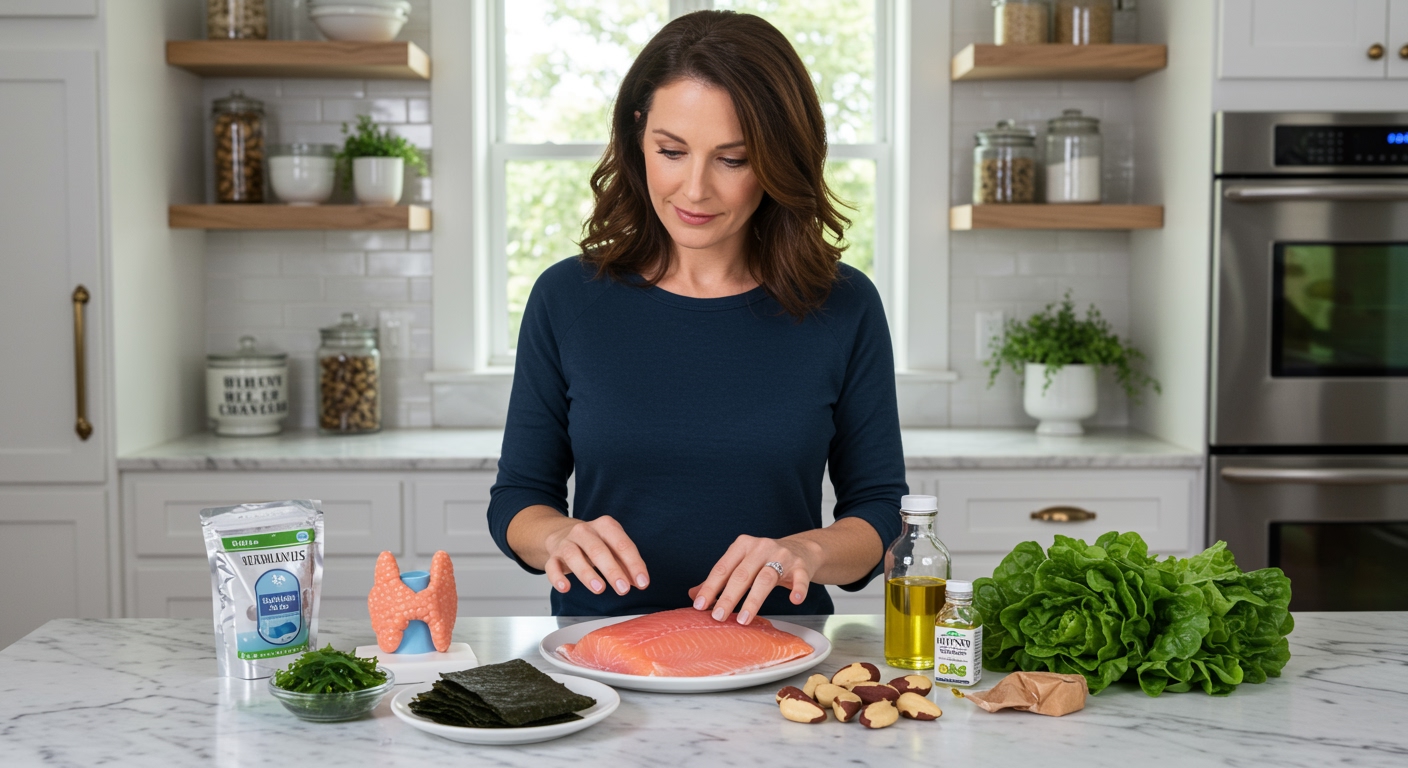✪ Key Takeaway: Grouper is good for hypothyroidism because it provides selenium and protein, but its low iodine content means it should not be your only seafood choice.
Introduction
You stand at the fish counter staring at grouper and wondering if this expensive fish will help your sluggish thyroid.
You might be asking this question because someone told you that all fish are good for thyroid health, or maybe you read somewhere that seafood supports hormone production.
Hi, I’m Abdur, your nutrition coach, and today I’m going to explain exactly how grouper affects hypothyroidism and whether it deserves a regular spot on your plate.
What Makes Grouper Different From Other Fish?
Grouper is a lean white fish that lives in warm ocean waters and grows quite large over many years.
This fish contains about 20 grams of protein per 100 grams with almost no fat, making it one of the leanest protein sources available.
The texture is firm and mild, which makes it popular among people who dislike fishy tastes.
Unlike fatty fish such as salmon or mackerel, grouper contains minimal omega-3 fatty acids because of its low fat content.
The nutrient profile shows decent amounts of selenium, vitamin B12, and phosphorus but very little iodine compared to other seafood.
This nutritional difference matters significantly when you have hypothyroidism because your thyroid needs specific nutrients to function properly.
✪ Fact: Grouper can live up to 40 years and weigh over 400 pounds, which increases mercury accumulation in larger, older fish.
How Does Hypothyroidism Affect Your Nutrient Needs?
Hypothyroidism means your thyroid gland produces insufficient thyroid hormones, which slows down your metabolism.
Your thyroid needs iodine as the raw material to make thyroid hormones called T3 and T4.
The mineral selenium helps convert the inactive T4 hormone into the active T3 form that your body actually uses.
Without adequate protein, your body cannot transport thyroid hormones effectively through your bloodstream.
Zinc and iron also play supporting roles in thyroid hormone production and metabolism.
When you have hypothyroidism, your doctor typically prescribes synthetic thyroid hormone medication, but nutrition still matters because your body needs these nutrients to use the medication effectively.
The challenge is that not all foods provide the complete package of nutrients your thyroid needs.
✪ Note: If you have Hashimoto’s thyroiditis, excessive iodine intake can worsen your condition, so always consult your doctor before increasing iodine consumption.
Does Grouper Provide The Nutrients Your Thyroid Needs?
Grouper delivers excellent selenium content, providing about 40-50 micrograms per 100 grams, which covers roughly 70% of your daily requirement.
This selenium helps your body convert T4 to T3 and protects your thyroid gland from oxidative damage.
The high-quality protein in grouper supplies all essential amino acids your body needs for hormone transport and cellular function.
However, grouper contains minimal iodine, typically less than 10 micrograms per 100 grams, which is only about 7% of your daily need.
This low iodine content means grouper alone cannot provide the raw material your thyroid needs to make hormones.
The fish also lacks significant amounts of omega-3 fatty acids, which help reduce inflammation that can interfere with thyroid function.
So grouper gives you some thyroid-supporting nutrients but not the complete package.
✪ Pro Tip: Combine grouper with iodine-rich seaweed or use iodized salt in your cooking to create a more thyroid-friendly meal.
What Are The Potential Concerns With Eating Grouper?
Larger grouper species can accumulate mercury in their tissues because they live long lives and eat smaller fish.
Mercury exposure can interfere with thyroid function and worsen hypothyroidism symptoms over time.
The Environmental Protection Agency recommends limiting consumption of high-mercury fish to once per week or less.
Grouper is also expensive, which makes it impractical as a regular protein source for most people.
Some grouper species face overfishing concerns, so choosing sustainably caught options matters for environmental health.
The low fat content means you miss out on anti-inflammatory omega-3s that benefit thyroid health.
These concerns do not make grouper bad, but they mean you should eat it occasionally rather than daily.
✪ Note: Pregnant women and young children should avoid high-mercury fish entirely because mercury affects brain development.
How Should You Include Grouper In Your Hypothyroidism Diet?
Eat grouper once or twice per week as part of a varied seafood rotation rather than as your only fish choice.
Pair it with iodine-rich foods like seaweed, dairy products, or eggs to ensure adequate iodine intake.
Choose smaller grouper when possible because younger fish accumulate less mercury than older, larger ones.
Balance your weekly seafood intake by including fatty fish like salmon or sardines to get omega-3 fatty acids.
Cook grouper with healthy fats like olive oil or serve it with avocado to improve nutrient absorption.
Always take your thyroid medication on an empty stomach and wait at least 30-60 minutes before eating any food, including grouper.
This approach gives you the benefits of grouper without relying on it exclusively for your thyroid nutrition needs.
✪ Pro Tip: Grilling or baking grouper preserves its selenium content better than deep frying, which can create inflammatory compounds.
The Bottom Line
Grouper is good for hypothyroidism because it provides selenium and quality protein, but its low iodine content means you need other foods to support complete thyroid function.
No single food fixes hypothyroidism, but smart food combinations create the foundation for better thyroid health.
I would love to hear your experience with grouper or any questions you have about managing hypothyroidism through nutrition, so please share your thoughts in the comments below.
References
At NutritionCrown, we use quality and credible sources to ensure our content is accurate and trustworthy. Below are the sources referenced in writing this article:
- Mayo Clinic: Hypothyroidism Diet: Can Certain Foods Increase Thyroid Function?
- PMC: The Role of Selenium in Thyroid Hormone Metabolism
- Cleveland Clinic: Hypothyroidism: Symptoms, Causes, Treatment & Medication
- Healthdirect: Foods High in Iodine
- NIDDK: Hypothyroidism (Underactive Thyroid)





